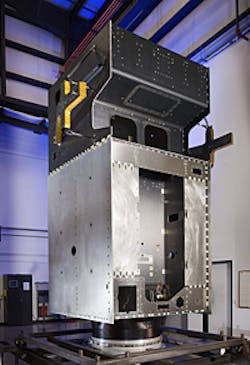Lockheed Martin receives core for fourth SBIRS GEO satellite
Featuring a mix of GEO satellites, hosted payloads in highly elliptical earth orbit, and ground hardware and software, SBIRS delivers missile warning capabilities while providing information to the military's missile defense, technical intelligence and battlespace awareness.
The SBIRS is intended to meet the space surveillance needs of the US for the first few decades of the 21st century. Introduced after several failed attempts at surveillance systems in the early '80s and '90s, the SBIRS saw its first satellite launched on May 7, 2011. The SBIRS has a total expected project cost of $10.4 billion and will include six geosynchronous satellites and sensors on two host satellites in a highly elliptical orbit.
The GEO-4 structure, which is identical to the previous three SBIRS GEO spacecraft, is made from composite materials designed to withstand the accelerations and vibrations generated during launch and support the spacecraft throughout on-orbit operations.
Lockheed Martin will integrate the propulsion subsystem with the core structure, which is used for maneuvering the satellite during transfer orbit to its final location, as well as conducting on-orbit repositioning maneuvers throughout its mission life. The integrated core propulsion module will then be shipped to Sunnyvale, Calif., for final assembly, integration and testing. SBIRS GEO-4 is on schedule to be available for launch in 2015.
Lockheed Martin’s SBIRS contracts include four highly elliptical orbiting (HEO) payloads, four GEO satellites, and ground assets to receive, process, and disseminate the infrared mission data. The team expects to receive funding to begin long lead parts procurement for the fifth and sixth GEO satellite by the end of the year. Additionally, under the Air Force’s Overhead Persistent Infrared (OPIR) Space Modernization Initiative (SMI), Lockheed Martin will evolve technologies to improve capability and affordability for future SBIRS spacecraft.
The SBIRS team is led by the Infrared Space Systems Directorate at the U.S. Air Force Space and Missile Systems Center. Lockheed Martin is the SBIRS prime contractor and Northrop Grumman is the payload integrator. The Air Force Space Command operates the SBIRS system.
